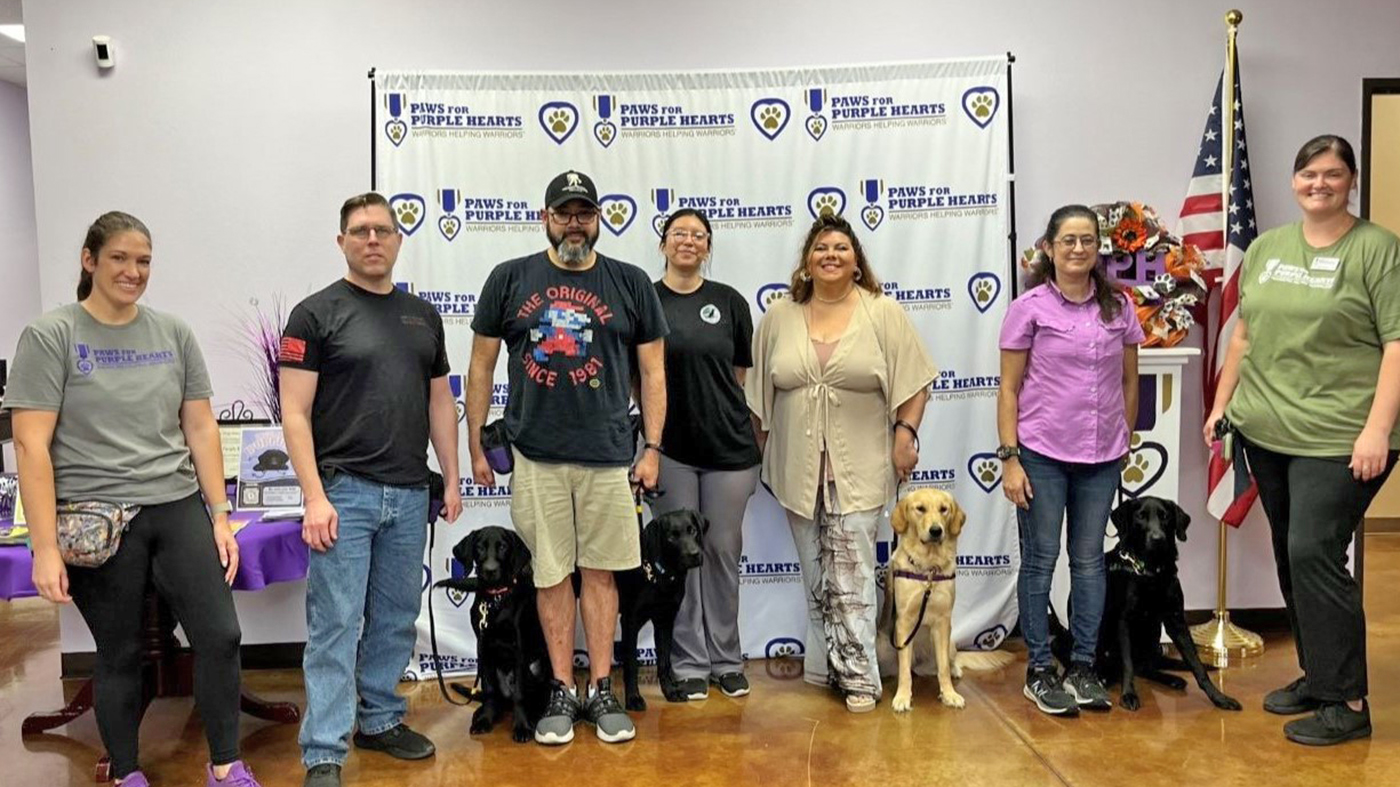VA is constantly innovating and seeking new ways to improve the well-being of Veterans. Among these efforts is the implementation of the Puppies Assisting Wounded Servicemembers (PAWS) pilot program.
It’s a groundbreaking initiative aimed at providing dog training to Veterans diagnosed with post-traumatic stress disorder (PTSD). This program, which operates as part of a broader complementary and integrative health strategy, is being piloted at five VA facilities across the country: Asheville, North Carolina; West Palm Beach, Florida; San Antonio, Texas; Palo Alto, California, and Anchorage, Alaska.
A unique approach to complementary care
The PAWS Act requires VA to conduct a five-year pilot program to provide dog training to eligible Veterans diagnosed with PTSD as an element of a complementary and integrative health program. The PAWS pilot explores how dog training can serve as a valuable component of a Veteran’s overall mental health care and is unique in that it does not provide Veterans with service dogs but instead involves them in the training process itself.
Veterans recommended for participation in the program work alongside other Veterans and certified dog trainers, assisting in the obedience and specialized training that service dogs require before they can be matched with other individuals in need. The pilot group consists of eight weekly dog training classes.
It’s important to note that while participation in the PAWS pilot may offer various benefits, it’s not intended to replace evidence-based treatments for PTSD. The training sessions are not considered a direct form of therapy, but rather a complementary activity that can serve to enhance a Veteran’s overall treatment plan.
Veterans in the program are encouraged to continue or initiate VA/DoD recommended treatments for PTSD, ensuring a holistic approach to their mental health care.
Expanding to include Veterans without a PTSD diagnosis
Recognizing the potential broader applications of the PAWS pilot, the VA San Antonio PAWS team is also running dog training groups for Veterans who have been diagnosed with major depression. This expansion is based on the understanding that the benefits of training a dog for another Veteran might extend beyond those diagnosed with PTSD.
When suffering from depression, it can be difficult to get moving and sometimes to even leave one’s home. Studies have shown that getting active can be helpful in treating depression. The dogs may be an extra motivator to get active for Veterans suffering from depression. Being around other Veterans and increasing opportunities for positive emotions and social support could also assist with symptoms of low mood.
“We are collecting data during the PAWS pilot on Veteran outcomes and satisfaction in order to determine next steps related to the pilot,” said Erin Romero, VA’s PTSD program manager. “It’s possible that being around other Veterans, dogs and the altruism of helping others may be beneficial as a component of wellness that reaches beyond a specific mental health disorder.”
Partnerships with leading service dog organizations
The success of the PAWS pilot is built on the support of three service dog organizations: Warrior Canine Connection, Paws for Purple Heart and Dogs for Life. These Assistance Dog International accredited organizations bring a wealth of expertise in service dog training, ensuring that the program adheres to the highest standards.
“VA is working with each of these organizations because they were already providing dog training classes for Veterans as an in-kind service and they were located near interested VA sites that represent geographically diverse areas. The support of these service dog organizations has been an integral part of the PAWS pilot implementation. We are grateful for their participation,” Romero said.
Feedback and looking ahead
Although the PAWS pilot is still in its early stages, initial feedback from both participating Veterans and program staff has been positive.
“It’s an honor to be a part of something that will help another person, and it also feeds my soul,” said Stephanie Streitenberger, a participant of the San Antonio inaugural depression pilot group.
“My personal experience at the PAWS pilot program has been a profoundly rewarding experience for me,” said program participant Yosaida Santana. “Through this program I have found a renewed sense of purpose and self-worth. Training these dogs not only aids in my own recovery, but also allows me to give back to other Veterans who are in need of support.”
Topics in this story
More Stories
The Medical Foster Home program offers Veterans an alternative to nursing homes.
Watch the Under Secretary for Health and a panel of experts discuss VA Health Connect tele-emergency care.
The 2024 National Veteran Suicide Prevention Annual Report provides the foundation for VA’s suicide prevention programs and initiatives.







Old Glory Service Dogs 4 Veterans in Bunnell, Florida provides free dogs, and training. They are an accredited 501c3 organization and is great for anyone living within an hour of them.
When can we have PAWS program in Washington State?? In particular, I would be interested in the program at the Seattle VA Hospital whenever the pilot program is over. Actually, this program should be offered to all VA facilities in the near future! I could see this saving veteran’s lives by providing canine companionship which gives an individual more responsibilities than just themselves.
If this program is ever at Wilmington DE VA or Philadelphia VA I’d like to be involved. I’m a 100% disabled veteran with many reasons why PTSD included. I have a German Shepard I’d like to have trained for a service dog. She’s my baby and knows when I don’t feel like myself.
Thank you
we need something like this in nj who can i contact want to get my dog certified as a therapy dog to go to hospitals for vets
we need something like this in nj who can i contact noe want to get my dog cerified as a theraphy dog to go to nurcery hosp for vets
Good day, I have PTSD/MDD. I would like to know can I use my German Shepard for this program and does the VA plan to expand it the NYC area?